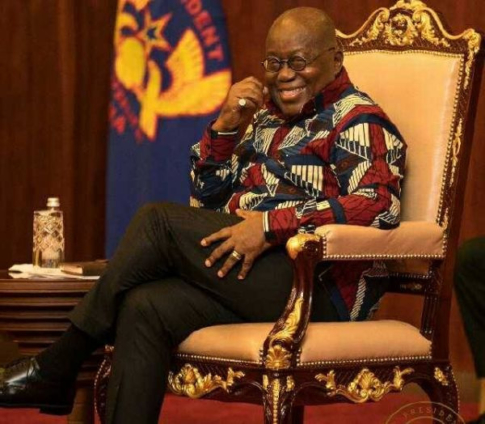Chairs. They are a part of our lives and culture. They support posture during work, leisure and all other social efforts.
In Ghana, we love sitting for long hours; through all the protracted sessions of Kete, agbadza, adowa, etc., dances and performances at funeral, burial services, weddings and christening of newborns.
We sit for long in churches, at other formal functions, at the launch of government policies, programmes or even the launch of KVIPs!
Chairs support us through it all.
Culturally, a visitor is welcomed by being asked to take a seat.
Unwelcome guests, particularly when the relationships are between higher-ranked persons and lower ranked persons, are made to stand (for example, a vice chancellor and a student).
The trick adopted is to let such an unwelcome guest go straight to the point, no pleasantries, no sitting, no chit-chatting.
Such unwelcome guests too usually get the message and leave as soon as possible.
I have not heard or seen a guest carrying along his or her own chair.
Such an act will be deemed as spurning the hospitality of one’s hosts.
It may mean that the one visiting deems himself or herself of a higher status than those he or she is visiting.
Symbolic
Chairs are symbolic too. They symbolise power, authority and wealth.
In 2 Chronicles 9: 17 to 19, the chronicler describes a throne Solomon built thus:
17: Moreover the king made a great throne of ivory, and overlaid it with pure gold.
18: And there were six steps to the throne, with a footstool of gold, which were fastened to the throne, and stays on each side of the sitting place, and two lions standing by the stays:
19: And twelve lions stood there on the one side and on the other upon the six steps. There was not the like made in any kingdom.”
Indeed, the chronicler states of Solomon’s throne: “There was not the like made in any kingdom.”
Accepted
From the verses, it is clear that Solomon’s throne was culturally accepted, more so when during his reign in Israel he made gold a common thing for all and silver in Jerusalem as stones (verse 27).
Additionally, Solomon’s throne, in all its majestic trappings, was not carried about.
It was fixed.
Some may argue that carrying my chair about, or “throne” (if God ever grants me the post of President), is a “security issue”, as we cloth all excesses!
That excuse is untenable, with a whole security apparatus at the beck and call of leaders or presidents.
Some may say that the chair or “throne” is to help with a medical challenge of a leader.
However, how long do leaders stay with their constituents at programmes to merit a chair being carried around solely for their comfort or health?
Indeed, most political leaders come to functions late and are the first to leave before the programme closes, with the same excuse of “another equally pressing engagement” that has either delayed him or her or brought about the urgency to leave.
For whatever purposes, taking a chair / “throne” when visiting is like telling your hosts that you are not willing to sit on the chair offered, to engage with them.
It shows that one sees him or herself as being of a higher social status than those being visited.
It does not show guests want to associate with hosts.
It certainly does not come across as empathising with constituents and associating with them to know how they live the daily grind.
Latest Stories
-
AEC 2024 renews momentum to lift Africa out of poverty despite global shocks
23 mins -
Can RFK Jr make America’s diet healthy again?
25 mins -
Maiden Women in Chemical Sciences conference opens with a call for empowerment
3 hours -
We’ll reclaim all Groupe Nduom stolen assets – Nduom declares
3 hours -
Center for Learning and Childhood Development Director Dr Kwame Sakyi honoured at Ghana Philanthropy Awards
12 hours -
Asantehene receives 28 looted artefacts
13 hours -
CAF WCL 2024: Ghana’s Thelma Baffour wins title with TP Mazembe
13 hours -
Benjamin Boakye slams politicisation of energy sector issues and ECG’s inefficiencies
14 hours -
Erastus Asare Donkor and Dr Neta Parsram win big at 10th Mining Industry Awards
14 hours -
Government is “suppressing information” about power sector challenges – IES Director
14 hours -
Majority of our debts caused by forex shortfall – ECG Boss
14 hours -
Pan-African Savings and Loans supports Ghana Blind Union with boreholes
15 hours -
Bole-Bamboi MP Yussif Sulemana donates to artisans and Bole SHS
15 hours -
Top up your credit to avoid potential disruption – ECG to Nuri meter customers
15 hours -
Dutch & Co wins 2024 Entrepreneur of the Year Award
15 hours

